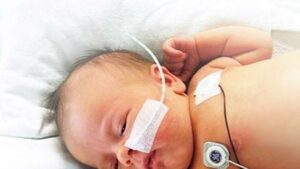Babies born with Neonatal abstinence syndrome( NAS) are going to be a growing problem in the opioid epidemic causing an increase in babies being born addicted to drugs. This can cause a number of problems for the baby, including seizures, breathing problems, and low birth weight. In this blog post, we will discuss neonatal abstinence syndrome and what you can do to help these babies.
Contents
What Is NAS?

Neonatal abstinence syndrome( NAS) is a group of problems that can happen in a newborn who was exposed to addictive illegal or prescription drugs while in the mother’s womb.
Illegal drugs such as heroin, methadone, and cocaine. These drugs are passed from the mother to the baby through the placenta.
Prescription drugs such as opioids (painkillers), benzodiazepines (anxiety medications), and barbiturates (sleeping pills). These drugs can be addictive and are often misused. If a pregnant woman takes these drugs, they can also be passed to the baby through the place
Symptoms
There are various symptoms of neonatal abstinence syndrome, which may include:
- Agitation
- Anxiety
- Body tremors
- Crying
- Diarrhea
- Excessive sucking
- Feeding difficulties
- Fever
- Hyperactive reflexes
- Increased muscle tone
- Increased stools
- Irritability
- Poor feeding
- Seizures
- Sneezing
- Sweating
- Temperature instability
These are a few symptoms a baby with NAS may experience, and they can range from mild to severe.
Causes
There are various causes of babies with Nas. They are as follows:
Congenital neoplasms
These are growths or tumors that are present at birth. They can be benign (noncancerous) or malignant (cancerous).
Infections
Viral, bacterial, and fungal infections can all lead to babies with Nas.
Nasal trauma
This can occur during delivery or after an accident.
Inflammatory conditions
Allergies, colds, and sinusitis are all examples of inflammatory conditions that can lead to babies with Nas.
Genetic disorders
There are a number of genetic disorders that can cause babies with Nas, such as Crouzon syndrome and Apert syndrome.
If you think your baby may have Nas, it is important to see a doctor right away so that the cause can be determined and treated if necessary.
Risk Factors
There are various risk factors that can increase the chances of a baby being born with NAS. These include:
- The mother’s age: Teenage mothers are more likely to have babies with NAS than older mothers.
- The mother’s race: African-American and Native American women are more likely to have babies with NAS than white women.The Number of previous pregnancies: Women who have had more pregnancies are more likely to have babies with NAS than women who have had fewer pregnancies.
- The use of alcohol during pregnancy: Women who drink alcohol during pregnancy are more likely to have babies with NAS than women who do not drink alcohol during pregnancy.
- The use of illegal drugs during pregnancy: Women who use illegal drugs during pregnancy are more likely to have babies with NAS than women who do not use illegal drugs during pregnancy.
- The use of tobacco during pregnancy: Women who smoke cigarettes during pregnancy are more likely to have babies with NAS than women who do not smoke cigarettes during pregnancy.
- Exposure to environmental toxins: Women who are exposed to environmental toxins, such as lead or mercury, are more likely to have babies with NAS than women who are not exposed to environmental toxins.
- Having a family history of NAS: Women who have a family history of NAS are more likely to have babies with NAS than women who do not have a family history of NAS.
What Are The Treatment Options for Baby With NAS?

There are various treatment options:
Medical Plan
When your baby is born with NAS, it will likely be given a medical plan to help ease its withdrawal symptoms. This will often include:
- A slow and gradual taper off of the medications that you were taking during pregnancy. If you were not taking any medication for your addiction, your baby may just be closely monitored.
- Your baby will likely be given smaller, more frequent feedings to help them gain weight and avoid dehydration.
- Your baby may need to be put on a specialized feeding schedule if they are not able to breastfeed.
Your baby may be given supplements or medications to help ease their withdrawal symptoms, such as:
- Methadone
- Buprenorphine
- Phenobarbital
It is important to follow your baby’s medical plan and any instructions that you are given by their healthcare team. If you have any questions or concerns, be sure to ask. With the right care and treatment, your baby will be able to heal and thrive.
In the hospital
Infants with Nas symptoms need to stay at the hospital for a few days until the symptoms improve. They will be given plenty of fluids through an IV to prevent dehydration, and they may also be given oxygen if they have trouble breathing.
If your baby has a more severe case of NAS, it may need to be treated with medicine to help them withdraw from the drug they were exposed to in the womb.
After they are discharged
Once your baby is home, it is important to keep a close eye on them and their sleeping patterns. Make sure they are getting enough food and liquids, and that their diapers are being changed frequently.
You should also monitor their behavior for any withdrawal signs, such as irritability, tremors, or excessive crying.
If you are concerned about your baby’s health or think they may be displaying signs of withdrawal, please contact your doctor immediately.
Physical therapists treat babies with NAS
Nasal obstruction is a common problem in infants and can cause difficulty breathing, feeding, and sleeping. They can help to improve food intake, encouraging parents to try different methods of feeding their baby with NAS, such as using a nasogastric tube. Providing information on what type of food is best for a baby with NAS. Physical therapists can help babies with NAS by providing treatments that improve nasal airflow and reduce congestion. Treatments may include:
Postural drainage: This involves positioning the baby in different ways to help drain mucus from the nose. When your baby is lying down, mucus can pool in the back of the throat and cause coughing. Keeping your baby upright will help to prevent this.
Nasal suctioning: This involves using a suction device to remove mucus from the nose. For example, you may use a rubber bulb syringe to suction out the mucus.
Nasal washing: This involves using a saline solution to rinse the nose. The saline solution helps to thin the mucus and flush it out of the nose. You can use a neti pot, nasal irrigator, or another device to do a nasal wash
Manual techniques
Physical therapists may use their hands to gently massage and manipulate the tissues around the nose to improve nasal airflow.
Exercises: Babies with NAS may be taught specific exercises to help improve nasal airflow.
Physical therapists can also provide guidance to parents on how to care for their baby with NAS, including tips on positioning, feeding, and sleep. With proper treatment, infants with NAS can typically improve their symptoms and live normal, healthy lives.
Conclusion
It may be concluded that babies with NAS need extra care and attention. The best way to help soothe a baby with NAS is by becoming more informed about the condition and working closely with the baby’s healthcare team. There are many creative ways to help soothe a baby with NAS, and each family will need to find what works best for their baby. Some ideas include using a humidifier, suctioning the nose as needed, and using a saline nose spray. Remember to always consult with the baby’s healthcare team before trying any new home remedies.
Physical Therapy help patients recover from pain. If you’re experiencing Back pain, Shoulder pain, Knee pain, Neck pain, Elbow pain, Hip pain, or Arthritis pain, a physical therapist at MantraCare can help: Book a physiotherapy session.


